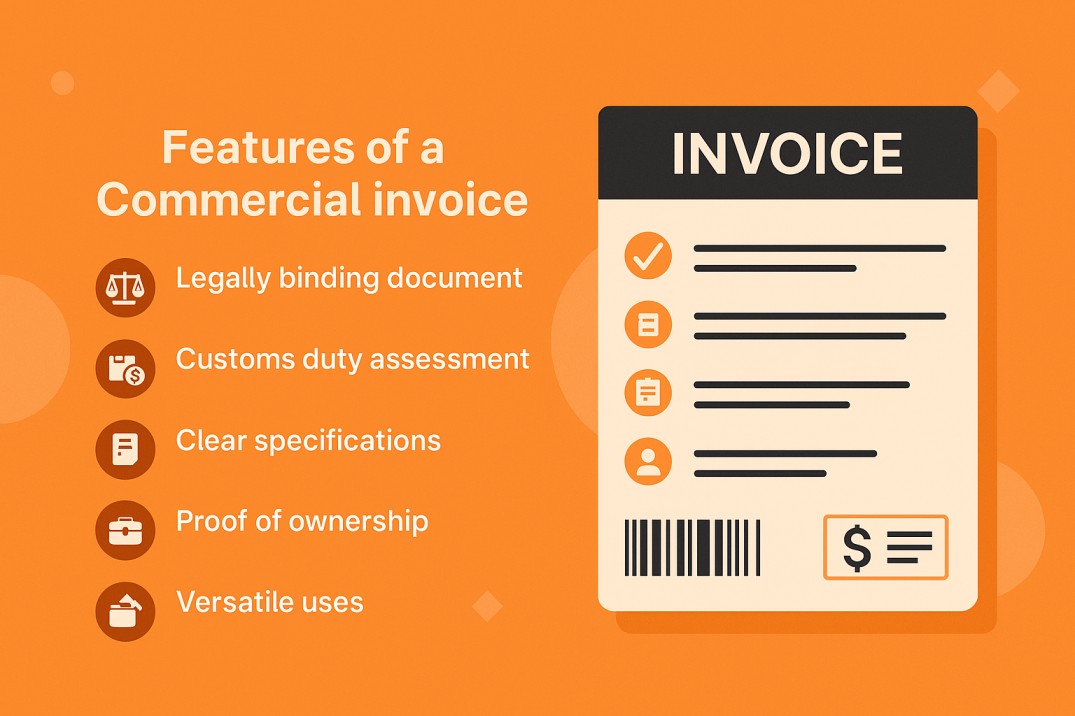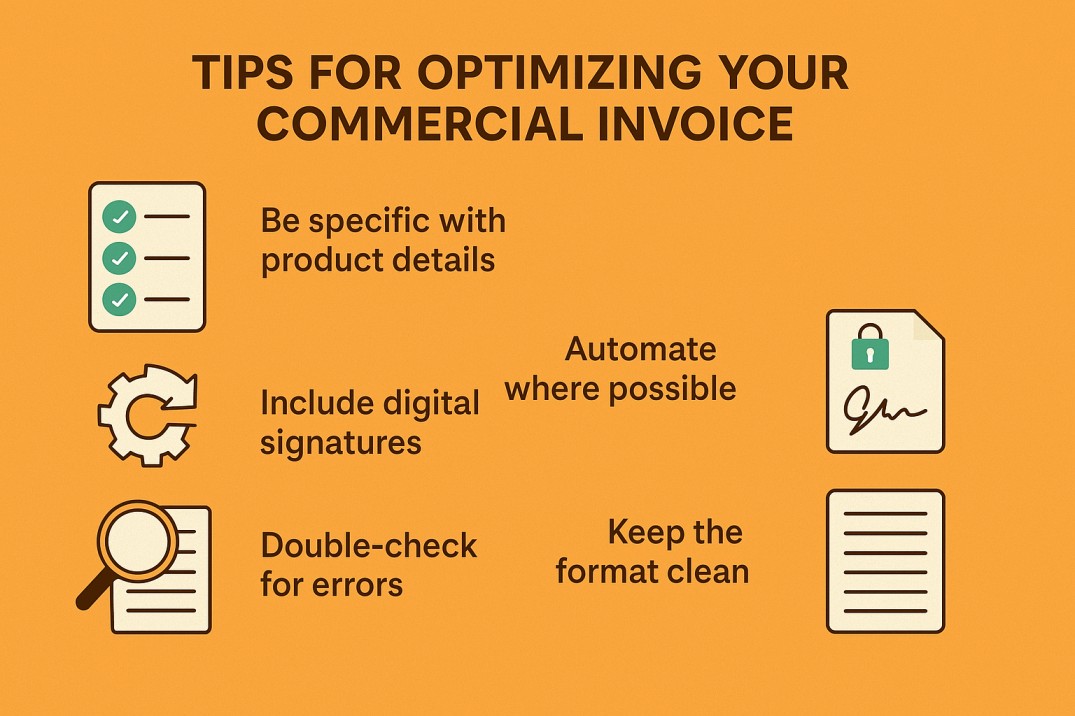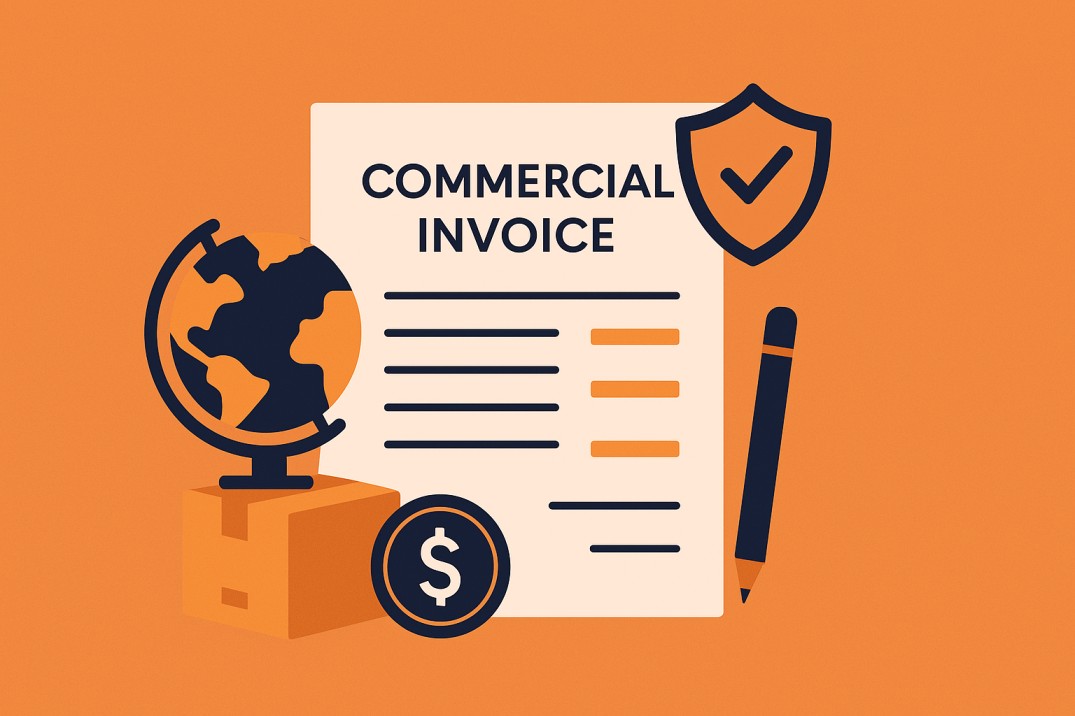A commercial invoice is one of the most important documents in international trade and logistics. This is the key record that facilitates accurate customs processing and ensures that the goods flow smoothly across the boundaries. For exporters and importers equally, understanding a commercial invoice is important to avoid delays, fines or punishment during shipping. The purpose of this blog is to provide a comprehensive guide to commercial invoices. Whether you are the owner of a small business that is starting only in foreign trade or an experienced professional, this article will run you through the best practices to create their features, importance, elements and a customized invoice.
What is a Commercial Invoice?
A commercial invoice is a legally binding document provided by a seller to a buyer. It acts as a record of the goods sold, giving details of the necessary information about the transaction. It is usually issued for international shipment, This document serves as proof of sale and facilitates customs clearance.
Purpose of a commercial invoice
- Customs Compliance: Customs helps officers to calculate duties and taxes.
- Financial Records: Acts as an official record for businesses and governments.
- Proof of transaction: Helps establish confidence between buyer and seller.
- Payment facility: Buyers often use it to arrange payment through their banks.
Commercial invoice bridges the gap between sellers, buyers and regulatory authorities, just like a purchase invoice records the buying side in procurement. Without it, the errors and miscommunication can delay the shipment.

Features of a Commercial Invoice
To understand why this document is unavoidable, it is helpful to see the underlying characteristics of it. Below are the standout properties of a commercial invoice:
- Legally binding documents: A commercial invoice serves as an official agreement between the buyer and the seller.
- Custom Duty Evaluation: This product provides details such as details, quantities and values, which assist in custom duty in tax calculation.
- Clear specification: It outlines all the specifications related to shipment, a critical requirement especially when handling open invoices where multiple transactions are pending.
- Evidence of ownership: By showing clear terms and conditions, it establishes ownership transfer. Versatile Uses: Although mainly used for customs duty, it can serve as a reference for insurance claims and financial audit.
Importance of a Commercial Invoice in International Trade
Why is a commercial invoice so important? The main reasons here are that it carries such weight in global business functions.
- Facilitates smooth customs processing: Customs Authorities use commercial invoices to inspect and clarify goods. Without it, shipment may face unnecessary delays or legal consequences.
- Import determines duties and taxes: The value of the goods listed on the invoice and the duties levied on imports, VAT, or tariffs on imports helps to determine.
- Serves as evidence of an international transaction: A commercial invoice protects both exporter and importer by clearly defining the terms of business.
- Ensures compliance in cross -border trade: Much like aligning documents for electronic invoice submissions to digital customs systems.
- The logistics supports the chain: Logistics companies depend on data listed in a commercial invoice for various tasks such as shipping, tracking and delivery accuracy.
Elements of a Commercial Invoice
A well structured commercial invoice includes both the details and additional information required to improve clarity and compliance.
Below are the main elements that should be included in each commercial invoice.
- Required information: Exporter and importer information Full name, address and contact details for both sides.
- invoice number: Unique identification for invoices, ensuring easy tracking.
- Details of goods: A wide breakdown of shipment material including sku, dimensions and weight.
- HS code or tariff code: Harmonized system code to classify goods for customs purposes.
- country of origin: Specifies where the goods were manufactured or produced.
- Prices, currency, and sales terms: The total cost and incoterms are used to describe the distribution and cost-sharing responsibilities in the agreed posture.
- Quantity: The number of units is being sent and their packaging details.
Additional Details
- Shipping Information: Carrier name, shipment mode, and tracking number.
- Date of Shipment: The timeframe when goods are dispatched.
- Signatures or Stamps: To validate the document’s authenticity.
Legal and Compliance Requirements for Commercial Invoices
Creating an invoice is not only about listing products and their values. Strict legal compliance for a commercial invoice to remain valid in global trade is standard.
- Incoterms Compliance: Specify applicable trade terms such as FOB (Free on Board) or CIF (Cost, Insurance, and Freight) to define responsibilities.
- Customs Regulations: Add additional approval for any country-specific rules such as essential tickets, languages, or restricted goods.
- Accurate classification with HS code: Calculation or confiscation can be done or confiscated as a result of errors in tariff classification.
- Proper currency declaration: Specify whether the cost is stated in USD, EUR, or other currencies, as it affects customs processing fees.

Difference Between a Commercial Invoice and Other Trade Documents
Here’s a clear comparison between a Commercial Invoice and other commonly used trade documents:
| Feature | Commercial Invoice | Other Trade Documents |
|---|---|---|
| Definition | A document issued by the seller to the buyer, detailing the sale of goods for export. | Varies depending on document type (e.g., Bill of Lading, Packing List, Certificate of Origin). |
| Purpose | Used for customs clearance, tax purposes, and as proof of sale. | Each document has a specific purpose like transportation, regulatory compliance, or product details. |
| Key Information Included | – Seller and buyer details – Description of goods – Quantity – Price – Terms of sale | Depends on the document. For example: – Bill of Lading lists shipment details – Packing List shows packaging specifics. |
| Issued By | Exporter or seller | Issuer varies by document type (e.g., shipping companies for Bill of Lading). |
| Legal Binding | Yes, it serves as a binding document in international trade. | Some may not be legally binding (like a Packing List), while others like a Letter of Credit are financial agreements. |
| Importance in Trade | Essential for customs and tax-related processes. | Equally important but tailored to specific trade and shipping processes. |
How to Create a Commercial Invoice
Follow these steps to create a compliant and professional commercial invoice.
- Use online software or templates: To save time and ensure stability, leverage invoice-generation tools or software with pre-made templates.
- Include the required details: Add the exporter/importer details, product description, price and shipping special.
- Include legal conditions: Be sure to define terms to clarify all responsibilities of transportation costs and risks.
- Ensure Customs Compliance: Verify the HS code, currency declaration, and country of origin labeling to meet both domestic and international regulatory standards.
- Use a professional layout: Ensure that the document is clearly formatted, and major classes such as pricing and volume are not disorganized.
Common Mistakes to Avoid
Mistakes in this document may cause heavy fines or delays in shipment. Look out for the following harm.
- Leaving the main details: Remembering marks such as HS code or native country, can lead to customs rejection.
- Wrong currency or value: Failing to tell prices to be wrong or turning them into agreed currency can delay payment settlements.
- Incorrect details: Ensure accuracy in size, material, and volume to avoid unnecessary confusion, just as you’d cross-check information during vendor invoice management to prevent disputes.
- Failed to align with credit letters: If a letter of credit underlines the payment criteria, make sure that the invoice follows its terms.

Tips for Optimizing Your Commercial Invoice for Efficiency
Be specific with product details: Reduce accurate labeling and classification customs withdrawal time.
- Automate where possible: Use invoicing software to minimize errors and speed up invoice generation.
- Include digital signatures: These save time and ensure document integrity during electronic broadcasting.
- Double-check for errors: always proofied before presenting any typos or discrepancies with other trade paperwork.
- Keep the format clean: A blind clean invoice makes it easier to process it quickly for customs officers and logistic teams.
Conclusion
A Commercial Invoice is more than just a shipping receipt; This is an important lifeline for international trade. It ensures seamless transactions, improves operational efficiency, and minimizes costly errors in global trade. Whether you are selling a batch of manufactured items or importing raw materials, investing time to draft a well -structured commercial invoice will save you from countless administrative headaches below the line. Use this guide as your roadmap to ensure that your invoices are not only obedient, but adapted to success.
Create Invoices Instantly – Free & Easy!
Generate professional invoices in seconds with our Free Online Invoice Generator.
👉 Try the Invoice Generator Now

Leave a Reply